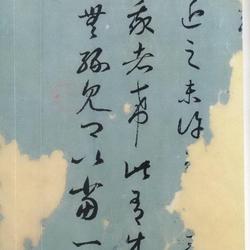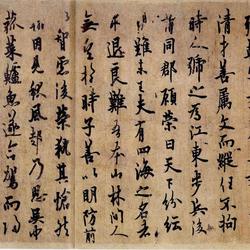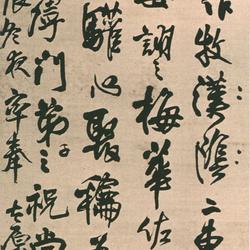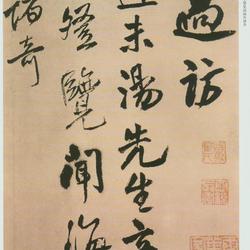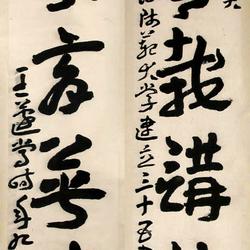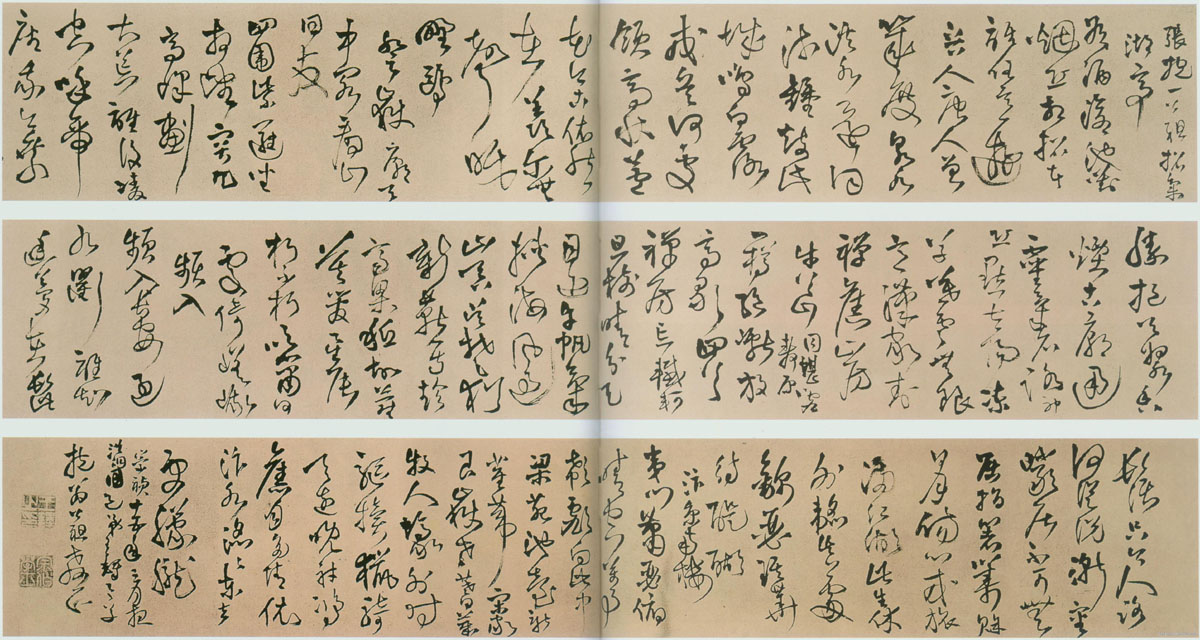
Wang Duo's "Presenting Cursive Script Poems to Zhang Baoyi" was signed in the fifteenth year of Chongzhen (1642). Ayamoto. Cursive writing. Five self-composed poems with seven rhymes and seventy-five lines, totaling 3,636 words. Length 469cm, height 26cm. Collection of Tokyo National Museum, Japan.
There are five poems in Qilu in the volume, three of which are found in "Selected Works of Xiashanyuan" (Taiwan Student Book Company). "Tianzhong Pavilion of Dengyue Temple and Looking at the Mountains Together with Friends" is contained in the ninth volume of the collection of seven rhymes, titled "A Feeling of Looking at the Mountains at Tianzhong Pavilion of Dengyue Temple". It was originally two poems, and the one written in the volume is the first. "Feng Ru" contains the third volume of Qilu. The "Waiting Daigo" written in the volume is concentrated as "Zui Daigo". "Bianjing Nanlou" also contains the third volume of Qilu. Although the other two poems are not included in the collection, there are three poems in the third volume of the Five Rhythms of the same book: "Zhanxu, Jingyuan You Niu Shou", "Yanziji Zhanxu Zhao Tong Jingyuan", "Shangtian Kaiyan Tong Zhanxu, Jingyuan", which are the same as those in the volume. "Niushou Mountain with Zhanxu and Jingyuan" - the poem is obviously written at the same time. Zhanxu, that is, Zhang Jingxin, whose courtesy name is Xiaosheng and whose nickname is Zhanxu. He will be a Jinshi tomorrow and become a minister of the Ministry of War. He is a close friend of Wang Duo. There are more than fifty poems related to Zhang Jingxin found in "Selected Works of Xiangshan Garden" (Taiwan Student Bookstore) and "First Collection of Xiangshan Garden". Zhang Jingxin also wrote the preface to Wang Duo's "The First Collection of Xiangshan Garden". He and Wang Duo are called "younger brothers", and he praised Wang Duo's poems as "as vast as the sea of smoke, and unprecedented in the family of rhetoric." In addition to the poems listed above, Jingyuan, who traveled with Zhanxu, also wrote a poem in volume four of the five rhymes of "The First Collection of Xiangshan Garden" titled "Send Hu Zeng Qu Jingyuan to Jinling". This poem was written about the eighth year of Chongzhen, and he knew Jingyuan His surname was Qu, who once held the position of Cao, and came to Nanjing one year before Wang Duo.
The first song in the volume, "Zhang Baoyi Gongzhu Gathers at the Lake Pavilion", from a poetic point of view, is Wang Duo's improvised work in the "Hu Pavilion". Zhang Baoyi, Mingpei, was born in Pinghu, Zhejiang. He was good at writing landscapes and was also knowledgeable in medicine. He is called "Gongzu" in the volume, which should be a local official of a certain place. The inscription is "March Night in the 15th year of Chongzhen", which shows that it was written at the same time as the long five-character scroll in running script "Ren Wu Chun Mo wrote in the Huaizhou Office".
Wang Duo traveled from Beijing to Huaizhou to mourn his father in the winter of the thirteenth year of Chongzhen. By the time he wrote this long scroll, he had spent more than a year in Huaizhou. In the summer of that year, Wang Duo and his family had returned once However, not long after that, he was attacked again by the peasant rebels. He took his family by boat and went eastward along the Yellow River. It was late summer.
This is the earliest of Wang Duo's cursive scrolls seen so far.
References "Selected Works of Xiangshan Garden" (Taiwan Xueniu Book Company) "First Collection of Xiangshan Garden" (10th edition of Chongji) "The Art of Calligraphy 9" (Japanese Chuo Koron Publishing House) (Kao Wenlongwen)
(The text refers to the Wang Duo volume of "The Complete Collection of Chinese Calligraphy" edited by Liu Zhengcheng published by Rongbaozhai)
Explanation:
Gongzu Zhang Baoyi summoned Huting
There is Jiucang Pond facing Yanqiu, and anyone who wants to invite you can swim freely. There were times when people from Jin and Tang Dynasties had springs and streams flowing together. The bells and drums are ringing in this city, and the white dew is ringing. Where can the soldiers lead the high autumn? The reed flowers are still there in this and ancient times, and the wild gulls sleep silently.
Dengyue Temple Tianzhong Pavilion Mountain Viewing Friends
Surrounded by purple flowers, people sit looking at each other, and the sudden peaks mark the wilderness. Who calls the emperor's throne in the sky again? I am now riding the victory to reach the sky. The cigarettes in the ancient temple bring spiritual energy, and the stone road and the sacred mound light up the sun. The frozen grass and dusk clouds are infinite, and the old mountain house in Hanjing is enshrined in Zen.
Niushou Mountain and Xujingyuan
A bottle of Jue Wan sings loudly, looking back at the meditation room and forgetting the ups and downs. Once the trees are clear and the celestial eye is close, the midday sail carries the sea breeze. The mountains swallowed up Wu and Chu, but the new Yan was still there, and the temples took advantage of Qi Liang and only lost their old roots. Don't care whether the stars are immortal or where the flute is leaning against the craggy hills.
Frequent entry
Frequently entering Chang'an and crossing Jiuqu, who knows that You Meng is in Muxu. I can't tell you where to go now. It's indispensable to gradually examine the rock. Counting the chopsticks to raise money on credit, the sun and the moon fill the rivers and lakes with sadness. In this life, I will stay away from home and stay true to myself, and I will be waiting for my wedding with beautiful and beautiful flowers.
Bianjing South Tower
Yimen looks down at the clear sky in a desolate manner, and everything is devoted to it. There are new reeds on the pond in Liangyuan, and there are old moss in Genyue of Song Dynasty. The shepherds are driving calves outside the trench, and the hunting horses are shooting at night from the horizon. The old moon clung to the Bian River affectionately, and became even more hazy as it surged eastward.
On the night of March in the fifteenth year of Chongzhen, Hongdong's younger brother Wang Duogu Cao and Baoweng Gongzu taught Zheng Zheng.

